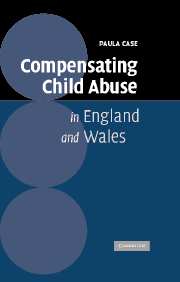Conclusion
Published online by Cambridge University Press: 19 July 2009
Summary
Mirroring the pattern of civil litigation connected with child abuse, the majority of this text has dealt with compensation for the harms inflicted by sexual abuse. Many have asserted that this type of abuse is unique in causing such extraordinary psychological repercussions to the abused and in being an act of such extreme heinousness on the part of the abuser. This distinctiveness has led to an assumption that the claims derived from sexual abuse merit special treatment by the courts. Whether or not these assertions of uniqueness are exaggerated, this perceived exceptionality has shaped the case law which emanates from claims for compensation. It seems that this real or perceived distinctiveness has found expression in two converse judicial responses: the ‘pliable’ and the ‘exacting’ responses.
Under the exacting response the courts tend to pronounce abuse claims as unworkable; their lack of fit with the templates of traditional tort actions may prompt the rejection of claims on procedural or doctrinal grounds. The courts express themselves as unwilling to accommodate this unfortunate victim and as not being prepared to distort principle to cater for an exceptional abhorrence. There are a number of examples of this approach in the jurisprudence of England and Wales, the most well known being Stubbings v. Webb, in refusing to accept that intentional abuse could be articulated as a ‘breach of duty’ in order to provide abuse victims with access to more generous and flexible limitation periods.
- Type
- Chapter
- Information
- Compensating Child Abuse in England and Wales , pp. 285 - 288Publisher: Cambridge University PressPrint publication year: 2007



